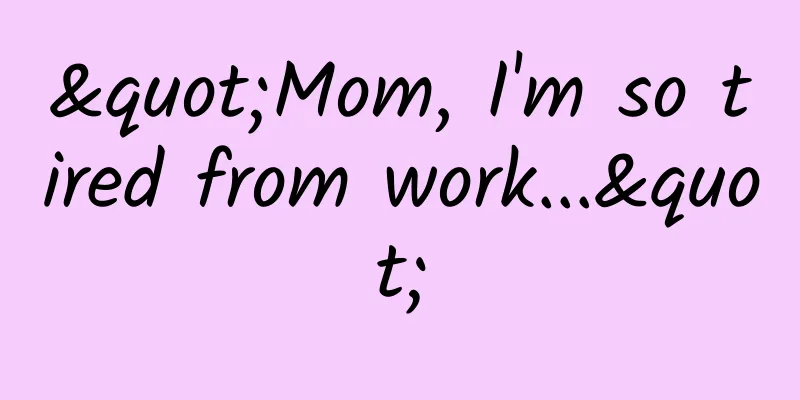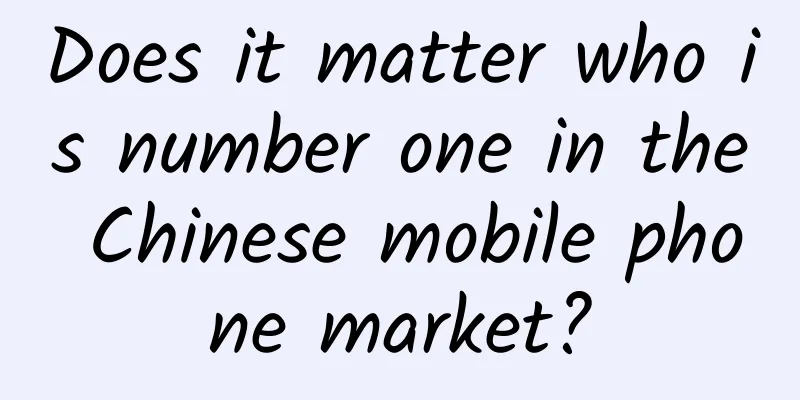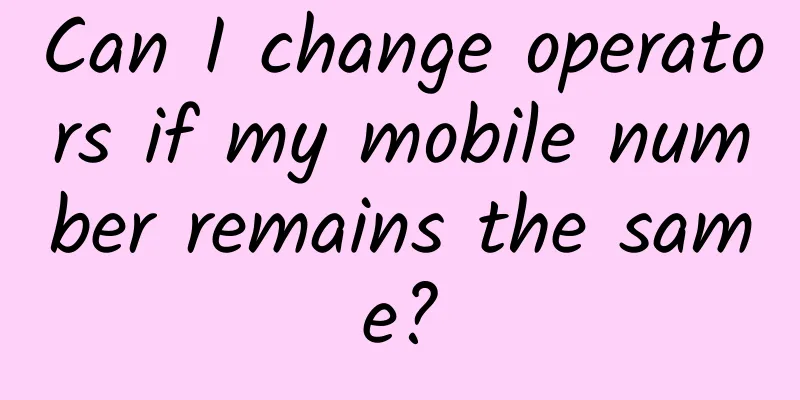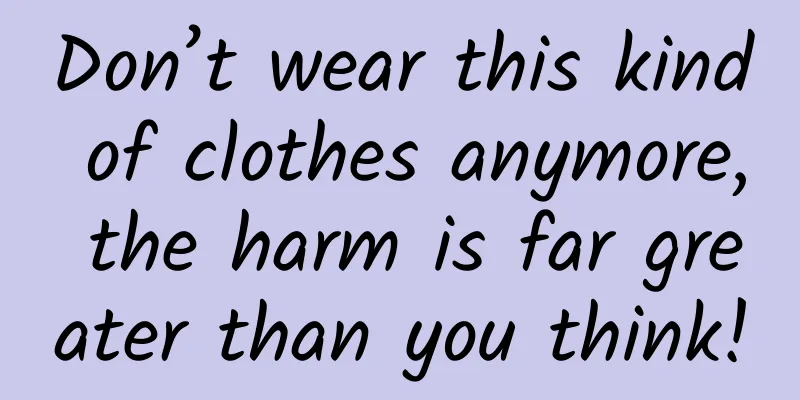"Mom, I'm so tired from work..."

|
"Mom is so tired from work" Some time ago, this sentence became a hot topic. The cause was a Weibo post by a netizen: I recently discovered something amazing: any sentence with the word "Mom" in front of it has a different flavor. For example, "I'm so tired at work" is just a common complaint, but "Mom, I'm so tired at work" is completely different. Just saying it in your mind will make you feel a little aggrieved, and you'll want to throw yourself into someone's arms and cry... I feel that the word "mother" is a swollen wound, which will burst into bitter tears if you poke it. It doesn't even have to do with your family of origin. When you read this sentence, everyone has an abstract mother in their mind, just like the mother that the little match girl saw in the firelight, warm, great, and always smiling without saying a word. Her sentiment resonated with many people. Some people say that when they encounter sad things, they can pretend nothing happened in front of others, and even talk and laugh, but when they hear their mother's voice, they can no longer hold back: Image source: Weibo screenshot Some people say that when they are tired, they will lie on the bed and pat themselves, so that they can pretend to be like their mother coaxing them to sleep when they were young: Image source: Weibo screenshot Some people also thought of "Dream of the Red Chamber". Cao Xueqin wrote that when Qingwen was dying, although she had never seen her mother, she stretched her neck and called her mother all night long... Image source: Weibo screenshot Have you ever had a similar experience? The small storms in daily life can be dealt with by just bearing with them, and may not be very obvious. But once you reach a moment of psychological collapse that you can no longer bear, the word "mom" will always magically appear in your mind, and your mouth will open and close silently - this process is even unconscious, and has nothing to do with the relationship you have with "mom" in your life. Image source: Weibo screenshot Why do we have unconscious expectations and dependence on "mom"? Looking for "mother" is human instinct There is a concept in psychology called "attachment theory". It emphasizes the innate human need for close emotional connections and secure relationships, often initially established with caregivers (such as parents or other guardians). These early attachment relationships establish internal relationship models for the individual and influence how the individual relates to others throughout life. In many cases, mother is the earliest caregiver and supporter in a person's life and the first object of emotional attachment and trust. When we were young, before we could speak complete sentences, when we encountered something we wanted or felt scared and helpless, we would babble and call for our mothers in the hope of being comforted. When we grow up, when we face difficulties and need help, we will still subconsciously show similar attachment behaviors - this may also be a "conditioned response." The person who can make us blurt out without thinking is the person we trust and love the most in our subconscious mind. At this time, "mom" is a symbol of care and security. Such a symbol will also give us an invisible comfort and support, making you feel that no matter how great the difficulties are or how incomprehensible they are to others, there is always someone who will silently and unconditionally support you behind your back. Such a hint can make people more confident in facing challenges. Copyright images in the gallery. Reprinting and using them may lead to copyright disputes. "Mother" Love and pain However, we have to admit that the word "mother" is complicated, which is the source of pain for many people. Image source: Weibo screenshot “When I wanted to cry and call for my mother, I wasn’t calling for my mother” "I seem to love the mother who appears in the candlelight, but my mother will come over and blow it out with an expressionless face." The imaginary "mother" is a safe haven, but the real "mother" may be the source of storms. It's not just "mom", it's also similar to "home". When working or studying away from home, I will subconsciously say, "I'm so tired, I want to go home," but many times I am not so happy when I go home. Just like the little match girl in the fairy tale, even if she burns all the matches in her hand, she cannot change the fact that the real world will eventually reveal its cruel and cold true face. Copyright images in the gallery. Reprinting and using them may lead to copyright disputes. If so, what should be done? On the one hand, people have subjective initiative. Sometimes, in some families, the generation gap objectively exists and may even lead to contradictions and conflicts. However, if the parent-child relationship itself is benign, there are still expectations and it has not collapsed, then it will not collapse because of a wrong word, a wrong thing, or a wrong reaction. Many parents and children will go through the stages of quarrel - cold war - reflection - reconciliation. In fact, there is no fixed routine for these handling methods. Family members will gradually find a way of getting along that suits them. But if you are in an unhealthy, bad, and broken parent-child relationship, such as abuse, cold violence, and long-term neglect among family members, it is better to be your own parent, your own child, love yourself again, and save yourself from danger thousands of times. If you happen to be a "mom" reading this, how should you respond as a parent so as not to disappoint your child? We also have some suggestions: From a problem-solving perspective, there are two types of responses from parents: "directly solving the problem itself" and "solving the emotions caused by the problem." It would be best if we can help solve the problem. If the problem is not that simple, then sometimes, what the person seeking help actually needs is emotional comfort. So the response of parents can be "asking about the heart, not the skills" - just like what was mentioned above, children may seek help from their mothers for an unconscious emotional support, rather than for "seeking skills", so just be a good listener. What we can do is actually to encourage and support them, so as to inspire their positive attitude and motivation for self-growth, which is also conducive to the development of individual self-esteem. Author: Zhang Xin, Associate Professor, School of Psychology and Cognitive Science, Peking University Reviewer: Fan Chunlei, Associate Researcher, Institute of Psychology, Chinese Academy of Sciences |
<<: It was a wrong decision after all! 0 sugar 0 calories 0 sucrose You lied to me so hard!
>>: Drones are just beginning to rewrite the rules of warfare, but their nemesis may have emerged
Recommend
There are less than 50 cases in the world! How rare is this golden blood type?
Audit expert: Jin Tao Chief Physician of Hematolo...
The burning of Red Cliff required not only strategizing but also acting skills
Mixed Knowledge Specially designed to cure confus...
Kunming Baidu Ai Procurement customer service phone number, how much does Baidu Ai Procurement promotion cost?
Baidu Aicaigou is a B2B e-commerce platform that ...
How do colored diamonds come about? They lose color after being polished!
Diamonds are rare and precious, and are even equa...
How do community products such as Zhihu and Xiaohongshu conduct user operations?
In my mind, I habitually compare product communit...
Meizu MX4 Pro with 20nm processor has better battery life than the old flagship
As the launch of Meizu's 2014 flagship MX4 Pr...
WeChat Reading VS NetEase Woniu Reading: Mobile Reading App Competitive Analysis Report
Due to the fast pace of modern life, people's...
Tencent Weibo Xiaoqingxin client source code download
Functional category: Social Supported platforms: ...
How much does it cost to produce the Xianyang wedding banquet mini program? Xianyang wedding banquet applet production price inquiry
How much does it cost to produce the Xianyang wed...
The secret of Pinduoduo’s cash flow for user growth
It has only been five years since Pinduoduo went ...
Google: How Android's private computing core protects data
Google has revealed more technical details about ...
How to effectively deliver short video information flow?
This article mainly introduces the preparations b...
The Future of Smart TVs from the Fight Between Xiaomi and LeTV
The war between Xiaomi and LeTV has been going on...
Two iPhones and a Watch: Apple's "late" press conference
In September, a month full of new phones, after m...
How to promote products through free promotion strategies?
The product has been launched and a free-to-use s...









